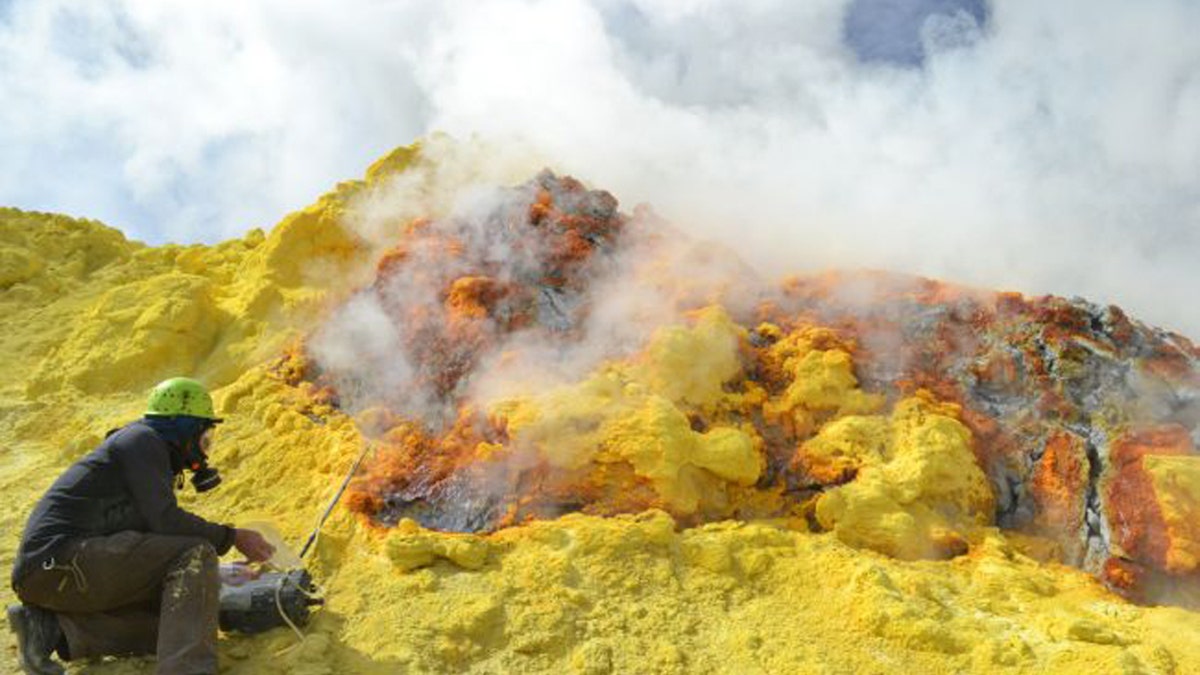
A researcher samples gas emissions released by Lastarria volcano on the border of Chile and Argentina. New research suggests that humans emit about 80 times more CO2 a year than every volcano on Earth combined. (Credit: Yves Moussallam, Lamont Doherty Earth Observatory)
Since 1750, humans have disrupted Earth's carbon cycle more severely than have some of the most cataclysmic asteroid impacts in history — and, new research suggests, the long-term effects on our planet (see: out-of-control global warming, ocean acidification, mass extinction) could be much the same.
This striking finding comes from a suite of papers published today (Oct. 1) in the journal Elements, authored by several teams of researchers from the Deep Carbon Observatory (DCO) — a global collective of more than 1,000 scientists studying the movement of all Earth's carbon from the core of the planet to the edge of space.
In a special edition of the journal, DCO scientists take a close look at what they call "perturbations" to Earth's carbon cycle over the last 500 million years or so. In that period, the authors wrote, the movement of carbon through our planet has been relatively stable — carbon gas (in the form of carbon dioxide and carbon monoxide, among others) being pumped into the atmosphere by volcanoes and subterranean vents is more or less balanced with the carbon sinking into the planet's interior at tectonic plate boundaries. This balance results in breathable air and a hospitable climate on land and sea that enables our planet's rich biodiversity.
Related: Doomsday: 9 Real Ways Earth Could End
However, every now and then, a cataclysmic event (or "perturbation") throws this balance out of whack, flooding the sky with the greenhouse gas carbon dioxide (CO2), disrupting the planet's climate over hundreds of years and often resulting in widespread extinction. In the new papers, the researchers identify four such perturbations, including several gargantuan volcanic eruptions and the arrival of the famous dinosaur-killing asteroid that struck the planet about 66 million years ago. Studying these disruptive events, the authors argue, may be key to understanding the next great climate cataclysm that's unfolding right before our eyes, and by our own hands.
"Today, the flux of anthropogenically generated carbon, primarily from [the] burning of fossil fuels that formed over millions of years, is contributing to a major perturbation to the carbon cycle," the researchers wrote in their introduction to the issue.
Indeed, they continued, the total amount of CO2 being released into the atmosphere every year by fossil fuel burning outweighs the cumulative amount of CO2 released by every volcano on Earth, by at least 80 times.
A striking impact
The most vivid comparison the authors draw between our current climate crisis and the perturbations of the past involves Chicxulub — the 6.2-mile-wide (10 kilometers) asteroid that crashed into the Gulf of Mexico 66 million years ago, leading to the extinction of 75% of life on Earth, including all the non-avian dinosaurs.
As the asteroid plowed into Earth with billions of times the energy of an atomic bomb, shock waves from the blast triggered earthquakes, volcanic eruptions and wildfires, possibly ejecting as much as 1,400 gigatons (that's 1,400 billion tons) of carbon dioxide into the atmosphere, the researchers explained. The greenhouse effect that resulted from these sudden emissions, according to the researchers, may have warmed the planet and acidified the oceans for hundreds of years to come, contributing to the mass die-off of plants and animals known as the Cretaceous-Paleogene extinction.
Related: Wipe Out: History's Most Mysterious Extinctions
Still, even the highest estimated Chicxulub-related CO2 emissions are less than the cumulative, ongoing emissions associated with man-made climate change. Those emissions, the researchers wrote, amount to about 2,000 gigatons of CO2 pumped into the sky since the year 1750. It almost goes without saying at this point that, due to a failure to take meaningful global climate action, man-made emissions are still increasing every year.
To be clear, these new studies do not argue that humans are somehow "worse" than a giant space rock that obliterated all life for hundreds of miles around in seconds flat. Rather, the DCO researchers are pointing out that the pace and scale at which humans are disturbing the planet's carbon balance are comparable to some of the most cataclysmic geologic events in history.
It's likely, the researchers wrote, that the results of this era of man-made meddling could look similar to the troubled centuries following Chicxulub and other ancient cataclysms. This era, the researchers concluded, "is likely to leave its legacy as a mass extinction from greenhouse-induced climate change on a biosphere already at a tipping point caused by habitat loss."
Are you perturbed yet? You should be.
- The Reality of Climate Change: 10 Myths Busted
- Images of Melt: Earth's Vanishing Ice
- 5 Ways Climate Change Will Affect Your Health
Originally published on Live Science.








































